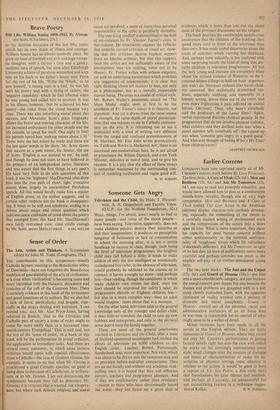Earlier Cozzens
LONGMANS have now reprinted nearly all of Mr. Cozzens's mature work before By Love Possessed. The first three, A Cure of Flesh (12s. 6d.), Men and Brethren (12s. 6d.) and Ask Me Tomorrow (I2s. 6d.), are easy to read and promptly attractive, and would have allowed him to pass as a comfortable middle-brow novelist, though one of very high competence. Men and Brethren and A Cure of Flesh (called The Last Adam in the American editions) display characteristic methods deVelop- ing, especially the embedding of the theme in a carefully studied setting of professional work and the compression of the action into a short span of. time. What is more important, they show his capacity for deep human concern without either sentimentality or the inverted sentimen- tality of 'toughness' (from which his robustness is decidedly different). Ask Me Tomorrow, in spite of its late date (at least of publication) seems more youthful and perhaps concedes too much to the implicit self-pity of its mother-dominated young hero.
The two later books—The Just and the Unjust (12s. 6d.) and Guard of Honour (18s.)—put him into a more considerable category, not just because the moral concern goes deeper but also because the themes and problems are grappled with in a still more closely embodied form, with the apparent confusion of reality wrested into a pattern of dramatic and moral complexity. Guard of Honour, created out of the personal, racial and administrative intricacies of an air force base in war-time, is remarkable for its control of what might seem to be a welter of detail.
Minor revisions have been made in all the novels in this English edition. They • are fairly numerous in Guard of Honour, where they reveal not only Mr. Cozzens's perfectionism in getting factual details right but also the care with which he works on his seemingly conventional prose style; small changes alter the nuances of dialogue and hence of characterisation or make the de- scription of physical settings more effective in relation to the action. It would" be good to have a reprint of S.S. San Pedro, a fine early story that foreshadows his later themes and methods. and perhaps of Castaway, an unsuccessful but not uninteresting farCasy in a technique sugges-


























 Previous page
Previous page